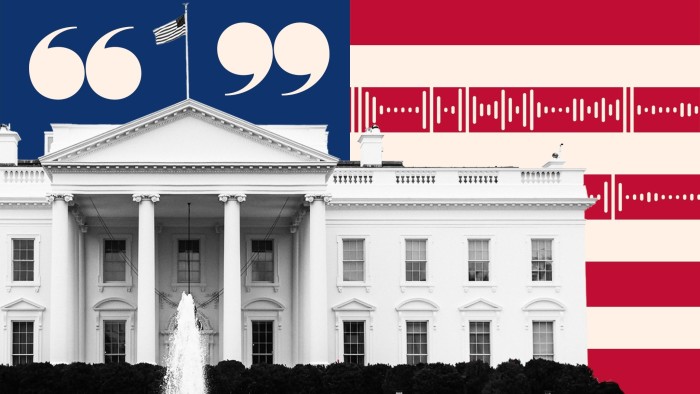Far-right parties have made significant gains in the EU elections, performing well in Germany and comfortably winning the vote in France, prompting Emmanuel Macron to call a snap parliamentary election.
An initial projection by the European parliament suggested that far-right and hard-right parties were on course to hold almost a quarter of the seats when the body next sits, up from a fifth in 2019.
The French president shocked his allies on Sunday by calling an immediate election for the National Assembly after exit polls gave France’s Rassemblement National (RN) 31.5 per cent of the vote, more than double the vote share of Macron’s centrist alliance.
“I’ve decided to give you back the choice,” Macron said in an address to the electorate from the Elysée palace.
The results delivered a stinging blow to the domestic standing of the French president and to Olaf Scholz, the German chancellor, and are expected to help tilt the European parliament towards a more anti-immigration and anti-green stance.
But parties of the centre retained a majority in the new parliament.
Exit polls put the centre-right European People’s party on track to win 189 seats, leaving the Socialists and Democrats in second place with 135 seats, with the liberal Renew group on 83, holding on to third place. The Greens are set to be the biggest losers falling from 71 seats in 2019 to 53, the estimates show.
In France, the RN party led by Marine Le Pen was expected to have come first with around a third of the country’s vote, according to exit polls on Sunday, in a rebuke to the centrist alliance of Macron, which secured around 15 per cent of the vote.
“This result is emphatic. Our countrymen have expressed a desire for change and a path for the future,” said Jordan Bardella, who led the RN’s campaign list.
In Germany, the three parties in Scholz’s coalition were all overtaken by the far-right Alternative for Germany (AfD), which came in second behind the conservative CDU-CSU opposition. Ultraconservative and nationalist parties also won or made significant gains in Austria, Cyprus, Greece and the Netherlands, exit polls showed.
The AfD defied recent scandals to take 16.4 per cent of the vote — one of its best results in a nationwide election, although lower than the 22 per cent share that polls had suggested in January.
“This is a super result . . . a record result,” said party co-leader Tino Chrupalla. “Our voters remained loyal to us and we beat the party of the chancellor, the Greens and the liberals.”
Its success came despite a flurry of negative headlines, many of them concerning its lead candidate in the election, Maximilian Krah. His staffer was arrested on suspicion of spying for China, and he sparked outrage by downplaying the crimes of the SS under the Nazis. The number two on the AfD’s list is, meanwhile, being investigated for corruption.
The result was a disaster for the three parties in Scholz’s fragile coalition — the Social Democrats (SPD), Greens and the liberal FDP. The Greens saw their share of the vote slump by more than 8 percentage points while the SPD garnered just 14 per cent — its worst-ever result in a nationwide vote.
The opposition centre-right CDU-CSU won the election with 29 seats, the SPD won just 14, the Greens 12 and the FDP 5.
In Italy, exit polls put Prime Minister Giorgia Meloni’s hard-right Brothers of Italy on top, with 26 to 31 per cent of the vote. The results will cement her position within her three-way coalition and strengthen her hand in negotiations with other European leaders.
“Kiss goodbye to the European Green Deal,” said Simon Hix, politics professor at the European University Institute in Florence, referring to the ambitious plan to hit net zero emissions by 2050.
He said the centre-right EPP of European commission president Ursula von der Leyen had become even more powerful, since it could work with parties to its left or right.
But the result, at the expense of liberal and Green parties, could complicate von der Leyen’s bid for a second term as head of the EU’s executive.
In the Netherlands, Geert Wilders’ far-right Freedom party (PVV) won seven seats, up from one seat last time, although still slightly fewer than a Labour-Green party alliance.
Parties belonging to the EPP had performed strongly in Germany, Spain, Poland, Greece and some other countries, the data forecast.
“There remains a majority in the centre for a strong Europe. The centre is holding,” von der Leyen said after the preliminary results. “We all have an interest in stability,” she added, appealing to the other centre parties to back her for a second term as commission president.
Von der Leyen needs a majority of the 720-seat parliament to back her. Final results are expected early on Monday.
Additional reporting by Laura Dubois in Brussels and Amy Kazmin in Rome
How will the European parliamentary elections change the EU? Join Ben Hall, Europe editor, and colleagues in Paris, Rome, Brussels and Germany for a subscriber webinar on June 12. Register now and put your questions to our panel at ft.com/euwebinar














































